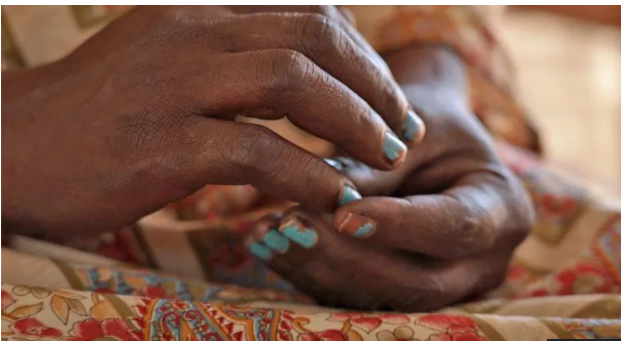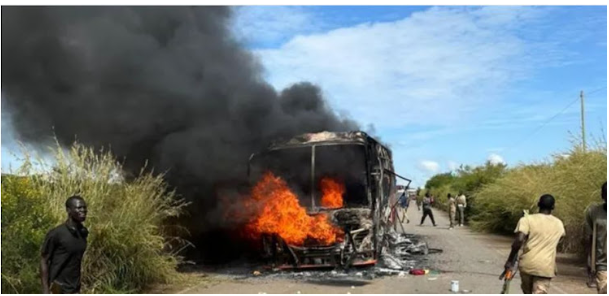 As Sudan plunges deeper into the chaos of a bloody civil war, women across the country find themselves at the center of unspeakable horrors. In the midst of bombings, militia raids, and widespread violence, sexual violence has become a weapon of war used to crush communities. The heart-wrenching plea of mothers, Rape me, not my daughters, echoes across the conflict zones—an unimaginable sacrifice to shield the younger generation from the atrocities they themselves have endured.
As Sudan plunges deeper into the chaos of a bloody civil war, women across the country find themselves at the center of unspeakable horrors. In the midst of bombings, militia raids, and widespread violence, sexual violence has become a weapon of war used to crush communities. The heart-wrenching plea of mothers, Rape me, not my daughters, echoes across the conflict zones—an unimaginable sacrifice to shield the younger generation from the atrocities they themselves have endured.The conflict, rooted in political instability and ethnic tensions, has torn the fabric of Sudanese society. What began as a power struggle between military factions has metastasized into a national crisis, with civilians caught in the crossfire. Rebel groups, militia fighters, and government forces ravage cities, towns, and villages with little regard for human life.
Women, often the most vulnerable in times of conflict, are targeted not just as victims of the violence, but as symbols of community defiance. Rape, used as a deliberate tactic of war, seeks to humiliate, dehumanize, and terrorize entire communities. Countless women are kidnapped, gang-raped, and forced into sexual slavery as fighters take over villages. Reports of sexual violence have surged as women old and young recount their nightmares, walking into makeshift refugee camps with vacant stares and bodies bruised beyond recognition.
In some of the most heart-wrenching scenes, mothers are forced to make an unimaginable choice: surrender themselves to the abusers to protect their daughters. The harrowing accounts of women pleading for their daughters’ lives, offering themselves instead, have shocked humanitarian organizations.
Amina, a 42-year-old mother from Darfur, recounts her story: When they came to our village, I knew what they wanted. I stood in front of my daughters and begged them, Take me. Do what you will with me, but spare my girls. They laughed and told me I had no choice. Amina was repeatedly assaulted as her daughters were forced to watch. Despite her desperate plea, the attackers violated her teenage daughters as well.
 The crisis in Sudan has displaced millions, with women and girls bearing the brunt of the violence. Those who manage to flee face harrowing journeys across hostile territory, seeking safety in overcrowded camps where they remain at risk of exploitation. The international community has been slow to act, with humanitarian aid and intervention efforts often hampered by the escalating violence. Meanwhile, survivors of rape and sexual violence, already stigmatized in their communities, grapple with the physical and psychological scars.
The crisis in Sudan has displaced millions, with women and girls bearing the brunt of the violence. Those who manage to flee face harrowing journeys across hostile territory, seeking safety in overcrowded camps where they remain at risk of exploitation. The international community has been slow to act, with humanitarian aid and intervention efforts often hampered by the escalating violence. Meanwhile, survivors of rape and sexual violence, already stigmatized in their communities, grapple with the physical and psychological scars.Doctors Without Borders and other organizations operating in the region report a flood of rape victims seeking medical help. However, resources are limited, and many victims are left without proper treatment, risking infections and trauma without adequate support. Psychological help is even scarcer, leaving countless women and girls haunted by the memories of their abuse, struggling with depression and post-traumatic stress.
As the world watches, Sudan’s war continues to unravel with no end in sight. Women remain on the frontlines, their bodies used as battlegrounds in a conflict fueled by hate, power, and brutality. While peace negotiations and international diplomacy move slowly, the mothers of Sudan continue to make the ultimate sacrifice to shield their children from a future marred by violence.
In the face of such unimaginable suffering, the resilience of these women stands as a testament to their strength, even in the darkest of times. Yet, the cries for justice, protection, and peace remain largely unanswered, as Sudan’s horrific war rages on.
This narrative highlights the cruel and devastating reality faced by women in Sudan, a country where war has stripped away humanity, leaving behind broken bodies and fractured lives.
Ennywealth


